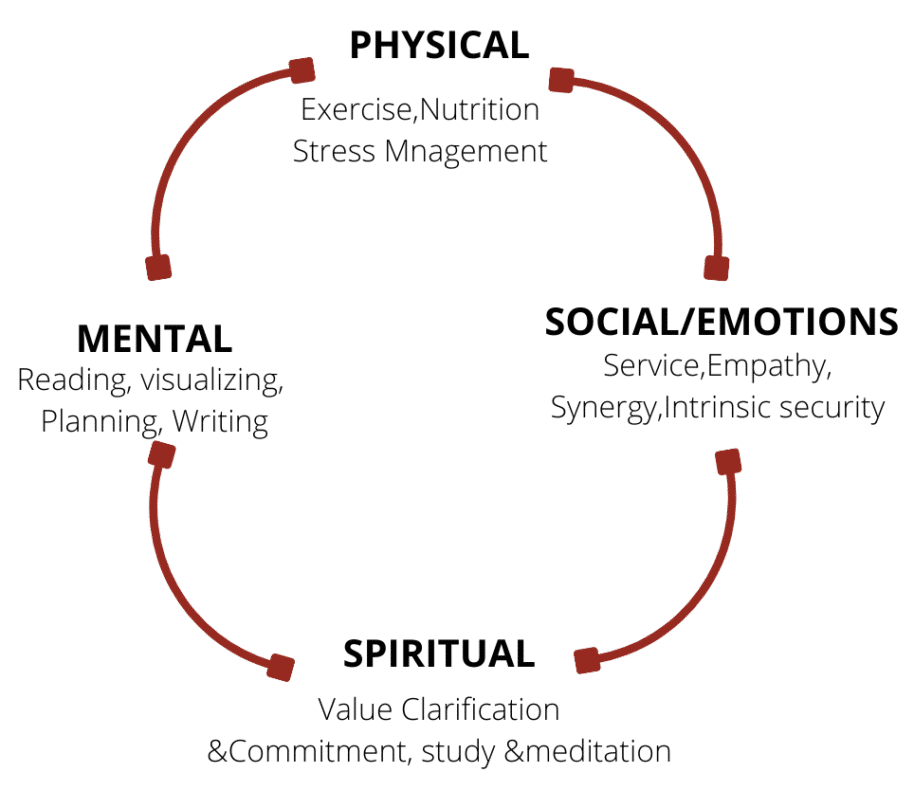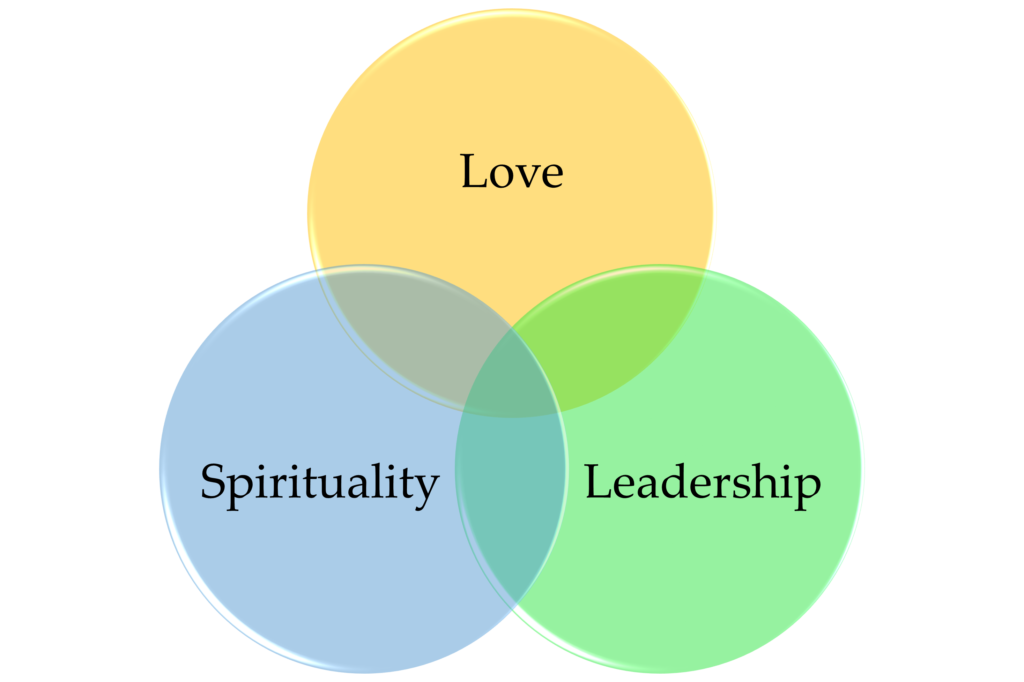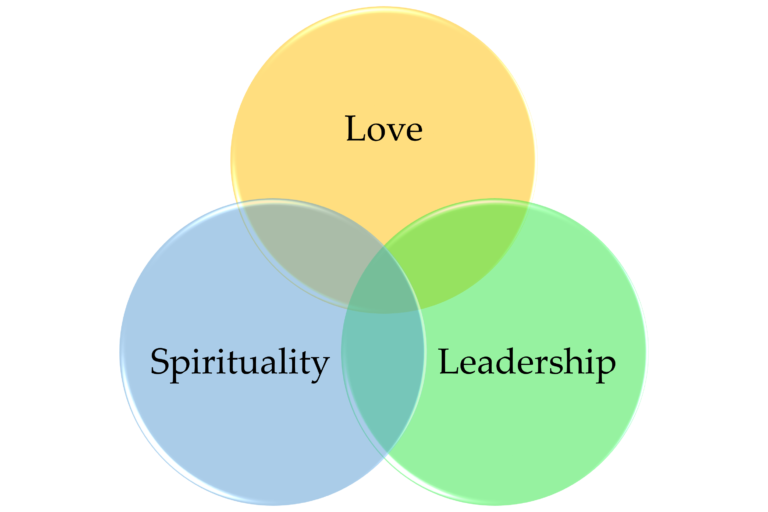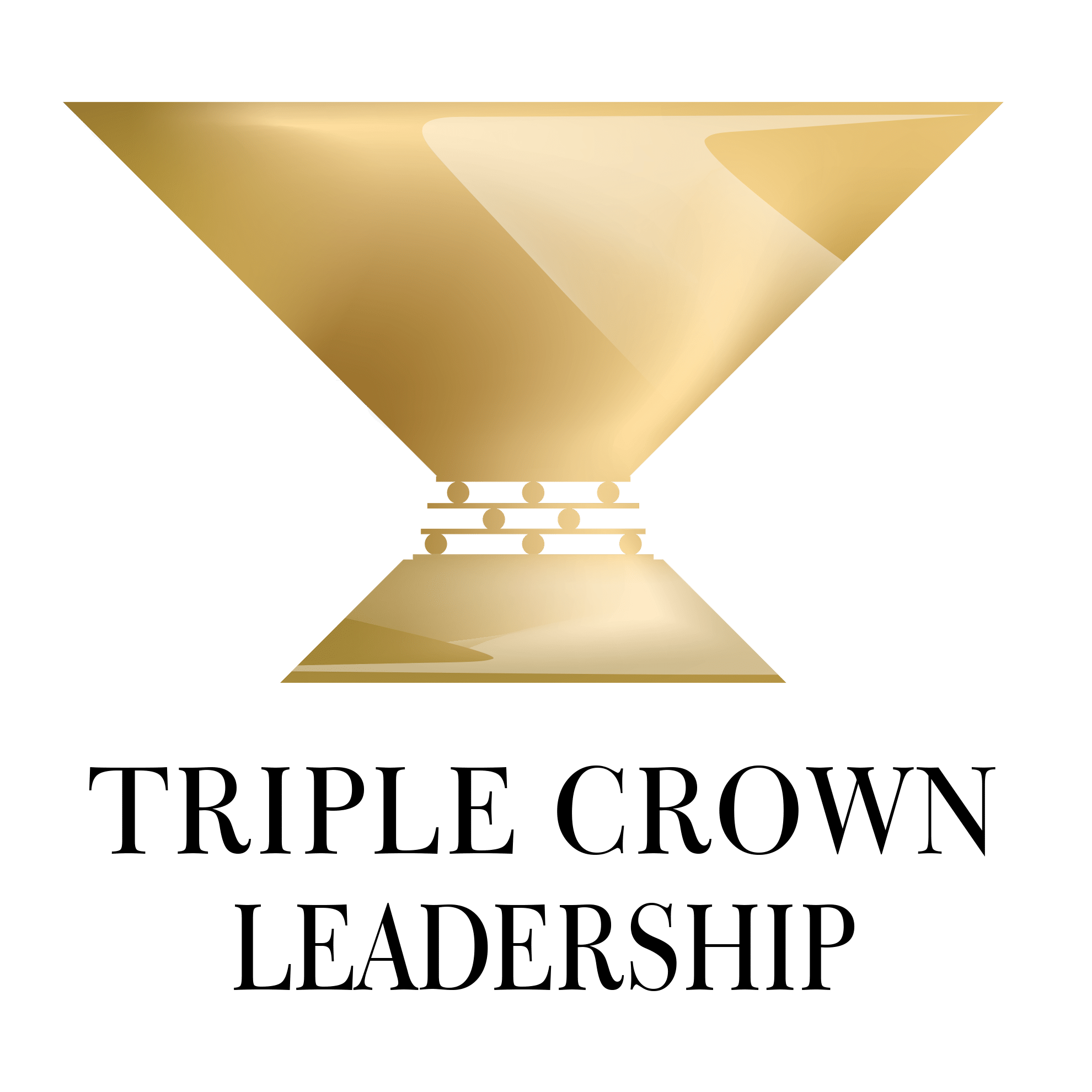Article Summary:
On the relationship between love, spirituality, and leadership—and leading with heart. The first in a three-part series on spirituality and leadership.
+ + +
Many of the derailers that inhibit the effectiveness of leaders concern matters of the heart and spirit that have gone awry for these leaders. For example, our Leadership Derailers Assessment includes these damaging leadership characteristics: abusive, bullying, burned out, controlling, disconnected, egotistical, hypercritical, intimidating, obsessive, toxic, and addicted to their work.
Let’s not pretend that leading is easy. It isn’t. But it’s critical for people in positions of authority to lead themselves first, starting with their hearts.
Our context doesn’t help. We live in a society struggling with materialism, consumerism, narcissism, fear, greed, division, manipulation, and workaholism. Many people these days are time-starved or numbing their lives away with constant streaming, emailing, or other distractions.
“The disastrous feature of our civilization is that it is far more developed materially than spiritually.
Its balance is disturbed.” -Jean-Paul Sartre, French novelist & philosopher
Thankfully, there are efforts to restore the balance—including the sustainability and conscious capitalism movements, and the desire for more meaning and fulfillment at work.
This takes us to the connection between spirituality and leadership. In our age of skepticism and cynicism, the thought of combining spirituality and leadership may generate resistance in some. But we believe there’s a vital connection between them. To understand it, first we need to define our terms and place them in context.

Personal Values Exercise
Complete this exercise to identify your personal values. It will help you develop self-awareness, including clarity about what’s most important to you in life and work, and serve as a safe harbor for you to return to when things are tough.
What Is Spirituality?
Though there’s no widely accepted definition of spirituality, it’s traditionally thought of as having to do with the human spirit, as opposed to material or physical things. Many think of it in terms of an age-old, universal human quest for inner peace and liberation, for awakening and enlightenment. A search for acceptance and self-transcendence—or transcendence of our ego (part of what the Buddhists call “non-attachment”).
Spirituality addresses fundamental questions. For many, it entails a recognition of our mutual interconnectedness and wholeness, and perhaps a quest to reach a higher level of consciousness or experience a sense of oneness with all.
Spirituality means different things to different people. For some, it’s about awareness, faith, peace, forgiveness, healing, ministry, service, and joy. For others, it’s about a search for meaning and purpose, appreciation of truth and beauty, or reverence for or worship of the sacred. It can entail connecting with nature, the cosmos, or the divine. And for some, it’s about mystery, revelations, miracles, or aspirations for heaven or nirvana. Love and compassion are at the center of it all.
There are different names for the divine in different spiritual traditions: Allah, Brahman, Buddha, Creator, God, Goddess, Great Spirit, Holy One, Holy Spirit, the One, Tao, Yahweh, and more. Most traditions have a general conception of God as a higher power.
“Spirituality,” writes author Peter Block, “is the process of living out a set of deeply held personal values, of honoring a presence greater than ourselves.” In her book, The Gifts of Imperfection, researcher Brene Brown writes, “The heart of spirituality is connection. When we believe in that inextricable connection, we don’t feel alone.”
Scholars have turned their attention to the subject of spirituality as well. In a 2000 scholarly article, Paul Anderson noted that the word “spirit” comes from the Latin word spiritus, meaning “breath,” and is defined as “the vital principle or animating force traditionally believed to be within living beings; one’s essential nature.” The definition of the word “soul,” he continues, is similar: “The animating and vital principle in the human being, credited with the faculties of thought, action, and emotion.”
Author Richard Barrett notes that an important part of our spiritual evolution is overcoming fear, including fear-based beliefs about not having enough of what we need to feel safe and secure, not feeling loved enough to be accepted by the group, and not feeling good enough to have the acknowledgment and respect of our peers and authority figures. Author and social forecaster Patricia Aburdene noted five hallmarks of spirituality: meaning or purpose, compassion, consciousness, service, and wellbeing.
Contemporary conceptions of spirituality often include a sharper break from traditional religious institutions than past conceptions, and they sometimes include a blend of things (e.g., humanistic psychology, mystical traditions, Eastern religions).

Leadership Derailers Assessment
Take this assessment to identify what’s inhibiting your leadership effectiveness. It will help you develop self-awareness and identify ways to improve your leadership.
The Difference between Spirituality and Religion
Some people equate religion and spirituality, but that’s a mistake. They’re related but not the same. The Dalai Lama expresses the differences well:
“Religion I take to be concerned with faith in the claims of one faith tradition or another, an aspect of which is the acceptance of some form of heaven or nirvana. Connected with this are religious teachings or dogma, ritual prayer, and so on. Spirituality I take to be concerned with those qualities of the human spirit—such as love and compassion, patience, tolerance, forgiveness, contentment, a sense of responsibility, a sense of harmony—which brings happiness to both self and others.”
-Tenzin Gyatso, the 14th Dalai Lama, in Ethics for the New Millennium

It’s been said that religion is an institution while spirituality is an experience. Our focus in this series will be on spirituality in this vein, separate from organized religious institutions. According to the International Institute for Spiritual Leadership:
“Workplace spirituality is not about religion or conversion, or about accepting a specific belief system. Spirituality at work is about leaders and followers who understand themselves as spiritual beings who have a sense of calling that provides meaning and purpose for their lives.”
Today’s Context of Changing Views
Meanwhile, perceptions of spirituality and religion are in flux these days. According to a 2022 Pew Research Center report, “As recently as the early 1990s, about 90% of U.S. adults identified as Christians. But today, about two-thirds of adults are Christians. The change in America’s religious composition is largely the result of large numbers of adults switching out of the religion in which they were raised to become religiously unaffiliated.” To that point, a 2021 Pew Research Center survey found that 28% of Americans identified themselves as spiritual but not religious. When Gallup asked Americans about their confidence in the church or organized religion in 2022, only 31% reported that they trust them a great deal or quite a lot, down from 52% in 2009.
Meanwhile, in recent years there’s been a big trend of mindfulness, meditation, and yoga in the workplace, as well as other workplace wellness initiatives. We see this in part as a response to the soul-crushing workplaces that so many of us endure. We also note the popularity of the work of Eckhart Tolle, Rick Warren, and other authors addressing spiritual topics.
“Business is a worldly activity. Business leaders have tended to separate their higher selves from the cut-and-thrust of commercial life. Yet, the line between business and spiritual life is becoming increasingly blurred.”
–The Times (London), “The workplace gets spiritual,” July 24, 2003
In his classic book, The Seven Habits of Highly Effective People, Stephen R. Covey outlined the four dimensions of our nature: physical, social/emotional, spiritual, and mental. See the image below:

Covey wrote: “The spiritual dimension is your core, your center, your commitment to your value system. It’s a very private area of life and a supremely important one. It draws upon the sources that inspire and uplift you and tie you to the timeless truths of all humanity.”
How does spirituality intersect with leadership?

Crafting Your Life and Work Course
Regain clarity, direction, and motivation for your next chapter, starting with a powerful foundation of self-awareness and commitment to your values and aspirations.
Leadership, Love, and Spirituality
We believe spiritual leadership is found at the intersection of spirituality, love, and leadership. The sweet spot is in the center of this Venn diagram, as shown below.

Let’s look briefly at these three.
- Love: In our article, “Love-Based Leadership in Action,” we noted the different types of love and stated that leading with love includes connecting, caring, recognizing, appreciating, giving, forgiving, having fun, and more.
- Spirituality: As noted above, this involves “love and compassion, patience, tolerance, forgiveness, contentment, a sense of responsibility, a sense of harmony,” according to the Dalai Lama.
- Leadership: In our triple crown leadership framework, leading entails motivating people to work together to build an excellent, ethical, and enduring organization.
Connecting the dots across those three domains, we arrive at a kind of leadership focused on people, heart qualities, a higher purpose, and positive actions in the world.
Clearly, spiritual leadership has resonance with and draws upon other prominent leadership frameworks, including authentic leadership, ethical leadership, inclusive leadership, servant leadership, transformational leadership, triple crown leadership, values-based leadership, and more.
In the academic literature, Texas A&M professor Louis W. Fry defines spiritual leadership as “comprising the values, attitudes, and behaviors that are necessary to intrinsically motivate one’s self and others so that they have a sense of spiritual survival through calling and membership.”* Professor Fry notes that the purpose of spiritual leadership concerns value and vision congruence across the levels of the organization to generate more commitment and productivity. He explains: “Spiritual leadership taps into the fundamental needs of both leader and follower for spiritual survival so they become more organizationally committed and productive.”
According to Fry, this entails creating a vision within which workers can experience a sense of calling (knowing their life has meaning and makes a difference) and establishing an organizational culture based on altruistic love. In such a culture, leaders and followers have and show genuine care, concern, and appreciation for themselves and their colleagues.
The International Institute for Spiritual Leadership (IISL) defines spiritual leadership as follows:
“Spiritual leadership involves intrinsically motivating and inspiring workers through hope/faith in a vision of service to key stakeholders and a corporate culture based on the values of altruistic love to produce a highly motivated, committed, and productive workforce.”
According to the IISL, spiritual leadership positively influences organizational commitment, productivity, product and service quality, customer satisfaction, and financial performance.
Leading with Heart
We believe that great leadership in all its incarnations is fundamentally a matter of the heart. Since “heart” can be an elusive concept, it helps to define it. We appreciate how Parker Palmer, an acclaimed American author and educator, described it:
“I’m using the word ‘heart’ as they did in ancient times, when it didn’t merely mean the emotions, as it tends to mean today. It meant that center in the human self where everything comes together—where will and intellect and values and feeling and intuition and vision all converge. It meant the source of one’s integrity. It takes courage to lead from the heart.”
Palmer makes the important connection between leadership and our inner life:
“The problem is that people rise to leadership in our society by a tendency towards extroversion, which means a tendency to ignore what is going on inside themselves.… But the link between leadership and spirituality calls us to re-examine that denial of the inner life.… Great leadership comes from people who have made that downward journey… who have touched the deep place where we are in community with each other, and who can help take other people to that place. That is what great leadership is all about.… There is no way out of our inner lives, so we’d better get into them. In the downward, inward journey, the only way out is in and through… the great spiritual gift that comes as one takes the inward journey is to know for certain that who I am does not depend on what I do…. When a leader knows that—the classroom is different, the hospital is different, and the office is different.”
Summary
Incorporating spirituality into our leadership practices involves tapping into the hearts of people to raise them from transactional workers who are there for the money to a deeper sense of relationship, community, purpose, and perhaps even calling or quest. When done sincerely, bringing spirituality into our leadership can elevate the experience of both leaders and followers while also improving organizational culture and performance–all while honoring the human beings around us and their rich and varied journeys through life.
Reflection Questions
- Do you see any connections between leadership, love, and spirituality?
- Are you willing to bring matters of the heart and spirit into your leadership—or begin discussing it with a mentor or your colleagues?
- Where will you begin, starting today?
Tools for You
- Leadership Derailers Assessment to help you identify what’s inhibiting your leadership effectiveness
- Personal Values Exercise to help you determine and clarify what’s most important to you
- Traps Test to help you identify what’s inhibiting your happiness, quality of life, and fulfillment

Personal Values Exercise
Complete this exercise to identify your personal values. It will help you develop self-awareness, including clarity about what’s most important to you in life and work, and serve as a safe harbor for you to return to when things are tough.
Related Articles, Books, & Other Resources
- “How to Bring Spirituality into Your Leadership“
- “Spirituality and Leadership in Action–Historical Examples“
- “Spirituality and Leadership in Action–Modern Examples“
- “The Case for Love-Based Leadership”
- “How to Bring Love-Based Leadership to Your Workplace”
- “Love-Based Leadership in Action”
- Paul Gibbons and Kelli Collins, The Spirituality of Work and Leadership: Finding Meaning, Joy, and Purpose in What You Do (Humanizing Business) (2020)
- Alan E. Nelson, Spirituality & Leadership (2016)
- Kathe Schaaf et al. (editor), Women, Spirituality and Transformative Leadership: Where Grace Meets Power (2014)
- Patricia Aburdene video, “Megatrend 2: Spiritualty and Business”
- Spiritual Leadership Balanced Scorecard Business Model**
PostScript: Quotations on Spirituality and Leadership
- “We are not human beings having a spiritual experience. We are spiritual beings having a human experience.” -Pierre Teilhard de Chardin
- “If a man is to live, he must be all alive, body, soul, mind, heart, spirit.” -Thomas Merton, monk, writer, theologian, mystic, and social activist
- “Without a spiritual element, a leader—whether political, economic, or otherwise—is definitely handicapped.” -Sadhguru, author and founder of the Isha Foundation in India
- “Our main job in life is to align with the energy that is the source of all energies, and to keep our frequency tuned to the energy of love.” -Oprah Winfrey, talk show host and author
- “People don’t talk about the soul very much anymore. It’s so much easier to write a resume than to craft a spirit. But a resume is a cold comfort on a winter night, or when you’re sad, or broke, or lonely, or when you’ve gotten back the test results and they’re not so good.” -Anna Quindlen, writer
- “The whole mechanism of modern life is geared for a flight from God and from the spirit into the wilderness of neurosis.” -Thomas Merton
- “…spiritual truth is diametrically opposed to the values of our contemporary culture and the way it conditions people to behave…. The collective disease of humanity is that people are so engrossed in what happens, so hypnotized by the world of fluctuating forms, so absorbed in the content of their lives, they have forgotten the essence, that which is beyond content, beyond form, beyond thought. They are so consumed by time that they have forgotten eternity, which is their origin, their home, their destiny.” -Eckhart Tolle, German-born spiritual teacher and author
- “These religious founders [Jesus, Buddha, Lao Tzu, Saint Francis of Assisi] disagreed with each other in their pictures of what is the nature of the universe, the nature of spiritual life, the nature of ultimate spiritual reality. But they all agreed in their ethical precepts. They all agreed that the pursuit of material wealth is a wrong aim…. They all spoke in favor of unselfishness and of love for other people as the key to happiness and to success in human affairs.” -Arnold Toynbee, historian
* Fry, L. W. (2003). Toward a theory of spiritual leadership. The Leadership Quarterly, 14(6), 693-727.
** Louis W. Fry, Laura L. Matherly & J.-Robert Ouimet (2010) The Spiritual Leadership Balanced Scorecard Business Model: the case of the Cordon Bleu-Tomasso Corporation, Journal of Management, Spirituality, & Religion, 7:4, 283-314.

Triple Crown Leadership Newsletter
Join our community. Sign up now and get our monthly inspirations (new articles, announcements, opportunities, resources, and more). Welcome!
+++++++++++++++++++++++
Gregg Vanourek and Bob Vanourek are leadership practitioners, teachers, and award-winning authors (and son and father). They are co-authors of Triple Crown Leadership: Building Excellent, Ethical, and Enduring Organizations, a winner of the International Book Awards. Check out their Leadership Derailers Assessment or get their monthly newsletter. If you found value in this, please forward it to a friend. Every little bit helps!


